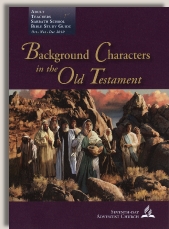|
||||||||||||||
Commentary on "Story and History"
Day 6: Thursday, September 30, 2010 - Rehoboam's Folly
Overview
The lesson gives a brief synopsis of the divided kingdom beginning with Jeroboam in the north and Rehoboam in the south. The northern kingdom finally went into Assyrian captivity in 722 B. C. The southern kingdom, under the rule of kings from the house of David, finally fell to the Babylonians in three separate exiles. The final assault occurred when Jerusalem feel to Babylon in 586 BC.
The lesson states, “The royal ‘experiment’ had come to an end,” and it ends with questions about what the eventual restoration of Israel tells us about God’s patience and grace, and how has the reader seen that same patience and grace?
Observations
First, there is nothing in the Bible to indicate that the monarchy was “royal ‘experiment’.” In fact, the establishment of the throne of David was one of God’s unconditional promises to Israel as well as to David. 2 Samuel 7:10-17 records God’s covenant with David:
And I will appoint a place for my people Israel and will plant them, so that they may dwell in their own place and be disturbed no more. And violent men shall afflict them no more, as formerly, from the time that I appointed judges over my people Israel. And I will give you rest from all your enemies. Moreover, the LORD declares to you that the LORD will make you a house. When your days are fulfilled and you lie down with your fathers, I will raise up your offspring after you, who shall come from your body, and I will establish his kingdom. He shall build a house for my name, and I will establish the throne of his kingdom forever. I will be to him a father, and he shall be to me a son. When he commits iniquity, I will discipline him with the rod of men, with the stripes of the sons of men, but my steadfast love will not depart from him, as I took it from Saul, whom I put away from before you. And your house and your kingdom shall be made sure forever before me. Your throne shall be established forever.’” In accordance with all these words, and in accordance with all this vision, Nathan spoke to David.
There is a strong undercurrent in Adventist teaching that Israel was never to have kings, that the fact the nation had a monarchy at all was the result of their disobedience. To be sure, their clamor for a king during the time of the judges was a rebellious demand that grew from a desire to be like the pagan nations. Their insistence on a king was a rejection of God’s leadership.
At the same time, God promised an eternal rule from the line of Judah from the point that Jacob blessed his twelve sons before his death as recorded in Genesis 49:9-12:
Judah is a lion's cub; from the prey, my son, you have gone up. He stooped down; he crouched as a lion and as a lioness; who dares rouse him? The scepter shall not depart from Judah, nor the ruler's staff from between his feet, until tribute comes to him; and to him shall be the obedience of the peoples. Binding his foal to the vine and his donkey's colt to the choice vine, he has washed his garments in wine and his vesture in the blood of grapes. His eyes are darker than wine, and his teeth whiter than milk.
Israel’s rebellion and disobedience is a sub-theme underneath the sovereign, eternal plan of God. God promised that Eve’s seed would crush the head of the serpent, and the rest of the Bible is devoted to showing how God keeps His promises.
Humans are responsible for their choices—and those choices have eternal consequences. Yet, in ways the Bible does not explain but which we are to believe and act upon, the purpose of God is eternal, and nothing any human does can thwart God’s plan.
God gave an unconditional promise to Judah and to David that a ruler would come from him and would sit on an eternal throne before which all nations would bow. The monarchy of Israel was never an “experiment”. It was part of God’s sovereign plan, and it was also a demonstration of what happens when humans choose to rebel against God.
God does not have a “Plan B”. He has ONE plane, and that one plan overarches all other events of men. God’s plans work out in God’s time, and human rebels cannot stop them.
Rehoboam was Solomon’s son. He was evil, and he refused to treat Israel with grace. Jeroboam had been Solomon’s servant to whom God had promised that, if he honored Him, He would establish a royal line from him.
When Solomon died, two “bombs” went off in Israel: Rehoboam and Jeroboam. Jeroboam led a group of people who begged Rehoboam to lighten the taxes. Rehoboam refused and took his seat on the Davidic throne in Jerusalem in the territory of Judah. Jeroboam became the leader of the dissenting tribes—all but Ephraim and Judah followed Jeroboam who was crowned king of the northern kingdom.
Rehoboam was wicked, and Jeroboam also apostatized. Jeroboam established golden calves as part of the “Yaweh worship” in the northern kingdom, and he also established two centers for worship in the north: Dan and Bethel. The altar at Dan, where Israel offered sacrifices to “Yaweh” and the golden calf was built upon an ancient pagan high place where sacrifices to false gods and demons. God had specifically commanded that Israel was to worship only in Jerusalem at the temple.
The northern kingdom had twenty kings, and not one of them honored God. The southern kingdom had about five kings during its entire span that more or less honored God…but the line of David had been preserved.
In spite of the dissolution of the Jews’ devotion to God, the fragmenting of the nation, and their return to captivity, God still kept His promises to Israel. Under the leadership of Zerubbabel, Ezra, and Nehemiah, God brought the southern kingdom back from Babylon, and the temple was rebuilt in Jerusalem, and Israel again worshiped God. Their return from captivity was also foretold, and God kept His promise exactly on time.
Moreover, the fact that Daniel and other Israelites were in the court of Babylon meant that God’s word was given an entrée into that nation. Furthermore, it is highly possible that the magi from the East who were watching for the birth of a promised Jewish king were informed by Daniel’s prophecies.
God makes no mistakes, and human mistakes do not thwart God. He is not dependent upon us for His plans to succeed. His patience and grace to Israel during their exile was realized in His returning them to their own land after 70 years. God promised He would, and He did.
His grace and patience to us is not measured in terms of His providing physical things in ways that we don’t deserve. Rather, His grace to us is realized in His sending His Son to rescue us from the captivity of our intractable sin. We are by nature objects of wrath (Eph 2:3). God gave us grace by sending His Son to become sin for us (2 Cor 5:21), to become a curse for us (Gal. 3:13), and to restore us to direct intimacy with God.
In Jesus we are delivered from bondage and exile, and we are adopted as sons and made part of God’s family (Ephesians 3; Romans 8).
There is only one “proper response” to God’s grace; we are to repent and accept the blood of Jesus as payment for our sin. God’s promises are non-negotiable. He has promised to save all who accept His Son, and He has promised to give the Son of David an eternal throne before which all nations will bow.
We must never think lightly of God’s grace or expect that He will be merciful “just because He is good”. He IS good—and His goodness includes His wrath toward sin. God will punish sin, but He will save all who call on the name of the Lord Jesus.
Summary
- The monarchy of Israel was not an “experiment”. It was foretold by God and came at exactly the right time.
- God made an unconditional promise to Judah and to David that an eternal rule would issue from their genetic line.
- The exiles of the northern and the southern kingdoms demonstrate the certainty of God’s conditional promises to the nation of Israel as stated in the Mosaic covenant.
- God’s purposes are accomplished in spite of man’s disobedience; Daniel and his prophecies brought the knowledge of God’s plan to send His Son to the pagan countries of the East.
- God’s grace to us is realized not primarily in the small blessings, although those are evidences of His grace. Rather, His true grace to us was His sending Jesus to die for our sin.
- We are by nature objects of wrath; our proper response to God’s grace is to repent and accept the blood of Jesus as payment for our sin.
Copyright 2010 BibleStudiesForAdventists.com. All rights reserved. Revised September 28, 2010. This website is published by Life Assurance Ministries, Glendale, Arizona, USA, the publisher of Proclamation! Magazine. Contact email: BibleStudiesForAdventists@gmail.com.
The Sabbath School Bible Study Guide and the corresponding E.G. White Notes are published by Pacific Press Publishing Association, which is owned and operated by the Seventh-day Adventist church. The current quarter's editions are pictured above.
Official Adventist Resources
Standard Edition Study Guide Week 1
Teacher's Edition Study Guide Week 1
Easy Reading Edition Study Guide Wk 1
Search the Complete Published Ellen G. White Writings


